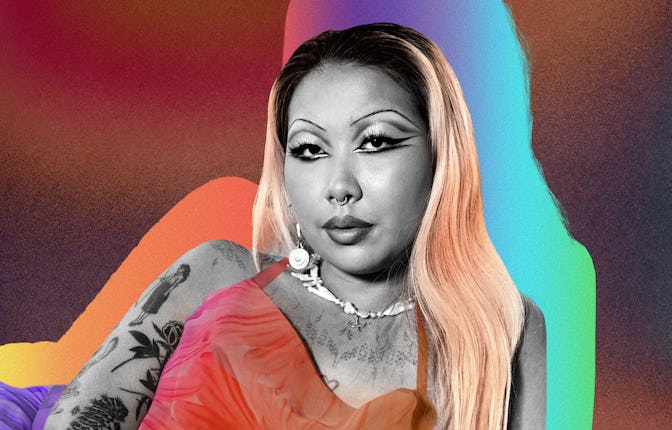Mimi Zhu’s Be Not Afraid of Love is a love letter to their queer community
Zhu penned their debut book after surviving an abusive relationship — and relearning how to love.

I first met Mimi Zhu last year in the backyard of a gay club; it was summertime and their hair was fading from a rosy peach to light blonde, the dark roots of their natural hair beginning to push through. They spoke to me softly about a book they were writing, a book that was going to be about love. I already knew of them through mutual friends — the queer Asian community runs tight in our part of New York — and knew vaguely that in 2020, Britney Spears was accused of being a communist after she shared one of Zhu’s Instagram posts about wealth redistribution.
As iconic as they’ve been in pop culture, Zhu’s influence as a writer has largely been confined to the internet, where they write about coping with feelings of insecurity, navigating boundaries, and the many things that prevent us from loving in ways that aren’t destructive. But Zhu’s voice is about to reverberate far beyond social media with their debut book released this week, Be Not Afraid of Love, which is a meditation on what they learned from queer community after surviving an abusive relationship. Although this book is for everyone, Zhu tells me their mind has always been on the people who taught them how to love. “I wanna see everyone reading this at Riis beach,” they tell me, referring to a popular queer hangout in Queens, New York. It’s a place where on any given day, you can see cackles of queers reading Alexander Chee and Ocean Vuong and where, in the next few months, we’ll probably see them reading Mimi Zhu.
“Dancing and celebrating, eating with and feeding queer people of color in this city has nourished me.”
Every chapter in Be Not Afraid of Love is based on a different emotion and woven with scenes of Zhu’s relationship to their former partner, ‘X,’ who serves as a focal point for how not to love. I asked Zhu how they would have described the feeling of love five or ten years ago, when they were in the throes of deeply unhealthy dynamics. “Passion,” they tell me. “I still believe that passion is a very powerful and central erotic force. At the same time, passion to me was like this possessiveness or obsession.”
Like most of us, Zhu first learned about love from their parents. As a child of Chinese immigrants in Australia, possessiveness and love tended to take on inextricable forms. They talk about how Western family dynamics value an extreme form of individuality, while Eastern dynamics take on porous, boundaryless forms to the point where our parents regard our bodies as their own. For example, Zhu tells me their parents were deeply hurt when they got tattoos — an experience I shared to a T with my own Chinese mother who, upon discovering the upside-down triangle on my upper right arm, told me I had damaged the body she gave me. “I kind of think sometimes our role as children of immigrants is almost to find that balance,” Zhu says, referring to maintaining a sense of individuality while also seeing the beauty of our interconnectedness. The boundarylessness many of us learn at home becomes an imperfect guide for future romantic relationships, and we sometimes equate love with losing all sense of ourselves. At the end of the day, Zhu says, “I am not you and you are not me.”
In a culture filled with so many tragic depictions of queerness, this is one of the few books that illustrates how the answer to broken systems lies in queer communities of color who understand love better than anyone — if only because we’ve overcome the unconditional hate of others.
Zhu might no longer be afraid of love, but other fears still linger with the release of their book. They’re afraid people will think they are “speaking out of their ass,” or that readers will think they don’t deserve the platform they have. They’re afraid that the inevitable criticism will affect their self-esteem, which they’ve worked hard to maintain. They are afraid that they’ll have nothing left to say after this book (they’ve already proven themself wrong, considering they’re currently working on another book). I was surprised to know Zhu has these insecurities — from the outside looking in, they seem charmingly at ease with themself. Then again, considering Zhu has taken everything that’s sacred to them and put it out into the world, it’s understandable.
If I’ve learned anything from being in community with Zhu and reading their work in the past year, it’s that a whole lot of people don’t know how to love in healthy ways, and most of those people are eager to do better. What makes Zhu’s work so special is that they learned to stop fearing love, not by following constructs and norms, but by destroying them. In a culture filled with so many tragic depictions of queerness, this is one of the few books that illustrates how the answer to broken systems lies in queer communities of color who understand love better than anyone — if only because we’ve overcome the unconditional hate of others. It’s incredibly powerful to think that our expansive vision of joy and intimacy has the power to heal people far beyond the confines of our little corner of Brooklyn. “Dancing and celebrating, eating with and feeding queer people of color in this city has nourished me,” Zhu says. “If I hadn't been in the community here, I would not have written this book.”